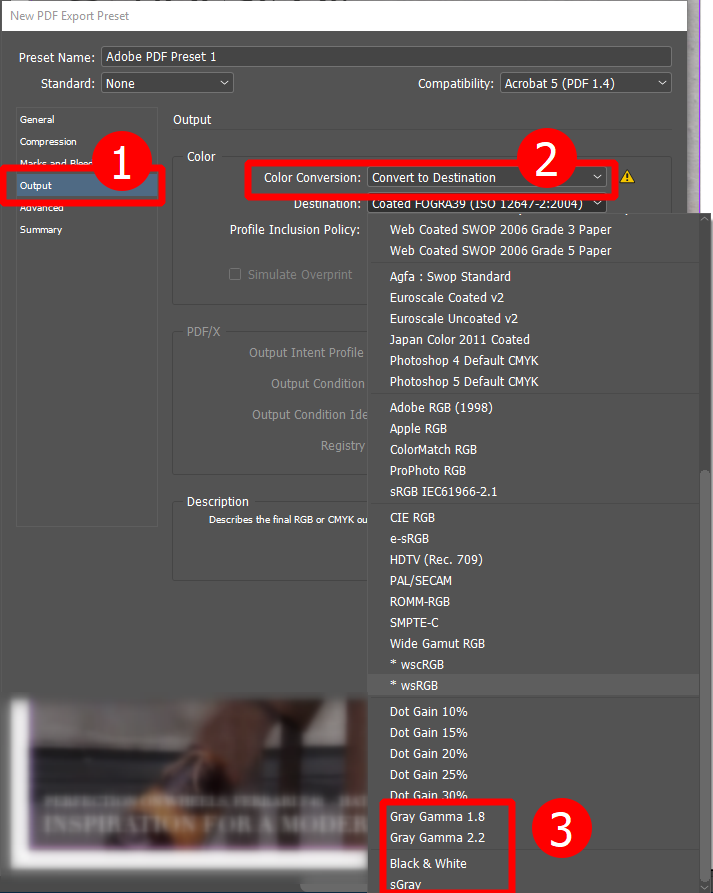- Home
- InDesign
- Discussions
- Convert color photos to Black and White in Indesig...
- Convert color photos to Black and White in Indesig...
Copy link to clipboard
Copied
How about a photo filter option in Indesign? It would save me so much time, if i didn't have to launch photoshop, convert a color photo to BW, save and then go back to indesign and reimport the BW image.
Thanks!
Page
 1 Correct answer
1 Correct answer
InDesign is a program for layout design, not image editing...
but, technically, you can do the color conversion while exporting PDF file

Copy link to clipboard
Copied
Awesome tip! Thanks!
Copy link to clipboard
Copied
BOOM is right! Thanks!
Copy link to clipboard
Copied
Thanks for this. Great for quickly previewing images BW without needing to go and edit image assets just to find out it won't work visually, and your method also works for digital-only assets and presentations.
In contrast to someone saying "no good advise", I'd like to say that I really appreciate your time to post a solution for this. All the best.
Copy link to clipboard
Copied
I'd like to request this feature too. For me- I need to designate some photos to print B&W, but not necessarily the entire document. It is helpful for those who print in-house and are billed by the page for color copies versus B&W copies. You shouldn't have to save a separate B&W copy of an image in order to print it that way from time to time. That just needlessly creates multiple copies of the same file - say, our logo, for example.
Copy link to clipboard
Copied
Do it here: Adobe InDesign Feedback
Copy link to clipboard
Copied
InDesign has no grayscale color space and there is no way to edit and save images inside of the app, so I think there is little chance of an image editing/conversion feature being added.
You can export PDFs as 1-plate grayscales, so you could export color and grayscale versions and use AcrobatPro to merge the pages using Tools>Combine Files.
Copy link to clipboard
Copied
I have been “watching” this thread for a while and after seeing what has and has not been said, a few observations:
(1) InDesign was implemented primarily to be a document layout program, excelling at text layout and placement of specialized graphic arts and even enterprise text, vector, and raster image content with support for special effects applied to single or groups of such graphic arts objects. As-is, it is a very complex and highly functional piece of software with an exceptionally steep learning curve due to all the functionality provided.
(2) Years ago, within Adobe, within engineering we actually discussed whether it made sense to fold together InDesign, Illustrator, and Photoshop functionality into a single application. Forgetting the technical complexity involved therein and the difficulty in implementing same (and this was before we added transparency to the Adobe imaging model), we came to the conclusion that the result would be a piece of software was overly complex to learn and use, not to mention develop and maintain. An attempt to be everything to everybody would have yielded something unusable by anybody! If you look at the complexity of Photoshop which tries to combine text and vector support with an already exceptionally complex set of raster image manipulation tools, you “get the picture” (pun very much intended) of what InDesign could have been worse than.
(3) Once add one piece of allegedly simple raster image “editing” functionality, you open up the floodgates to a myriad of others and tweaks to the initial feature. There is no end to that and overall program usability suffers per (2) above. An example of functionality requested many times has been that directly placing “camera raw” images. But for those who understand Photoshop and Lightroom's Camera Raw features, it is exceptionally rare for one to simply take a raw image from a professional camera and simply use it “as-is” with some default conversion. Camera Raw is like using a darkroom in the days of analog photography in terms of a vast array of adjustments that generally are made (otherwise one would simply use the JPEG directly out of the camera).
(4) The discussions in this thread have centering around a simple conversion from ICC color managed RGB images to “grayscale” where by “grayscale” we mean simply removing color data yielding R=G=B converted to grayscale or for InDesign's purposes, CMYK=(0,0,0,1-G).
(5) Unfortunately, as most long term, serious photographers know, such simple conversion to grayscale very often yields exceptionally suboptimal results with low contrast and distorted tonal values. Much if not most amateur and semi-professional content that I see these days in which color images are “converted” to grayscale is quite poor.
In the days of analog photography, black+white film did not give equal weight to all colors. And for many types of black+white images, especially landscapes, we used filters over the lenses to correct the rendition of color on black+white film.
If you want/need grayscale from color digital imagery, you don't simply convert to grayscale, you at least use the Image=>Adjustments=>Black & White tool to yield a conversion that is appropriate for the image content. Only the should you use the Image=>Mode=>Grayscale tool!
(6) And the same thing is true for text and color content “simply” converted to grayscale. Contrast and values are totally lost. Amateur hour prevails!
Bottom line is that if you really need to produce content in which color needs to be or even if you simply want the content to be converted to grayscale, overly simple hacks don't cut it. You can ask all you want for a new mediocre feature to be added to InDesign, but I doubt you will get it and if you did, whether you really would put up with the mediocre results.
- Dov
Copy link to clipboard
Copied
Hi,
In indesign, I am having more images with combination of color and gray. Is there any way to convert particular image to gray mode?
Thanks in advance.
by
hasvi
Copy link to clipboard
Copied
Hi Hasvi,
yes, with the help of PhotoShop.
Select the image you want to convert and do Open With > PhotoShop
Then either directly convert or first optimize the image for gray representation and then convert.
Regards,
Uwe
Copy link to clipboard
Copied
thanks for your reply, but I am expecting indesign script or pdf plugin to this conversion process without photoshop (because I don't have photoshop).
by
hasvi
Copy link to clipboard
Copied
Without PhotoShop?
No chance, I think. At least not with a script that will control the imaging process.
What's the pixel editing tool of your choice?
If it can go along with color management and the gray scale mode, you might have a chance to use that.
But not in an automatic way. For that you need PhotoShop.
Regards,
Uwe
Copy link to clipboard
Copied
Is this freeware tool "pixel editing tool"?
by
hasvi
Copy link to clipboard
Copied
What tool exactly?
Copy link to clipboard
Copied
Hi,
I am expecting some freeware tool to this process. Please let me know if you know that.
by
hasvi
Copy link to clipboard
Copied
I will not expect any freeware tool working with ICC profiles and grayscale mode.
Especially not running the Adobe Engine for color conversion. So you'll be out of luck, I think.
Invest in PhotoShop. That's my suggestion.
Regards,
Uwe
Copy link to clipboard
Copied
thanks
Copy link to clipboard
Copied
If you want to avoid spending much more, for almost 20 euros you've got ColorTranslator by LittleCMS. It's an utility that makes straight conversions (and unattended) using the Little CMS colour engine and ICC profiles.
But all the caveats about the amateurity and unproffesionality of converting colour to grayscale in such an automatic way apply.
And, if you use more software from Adobe (Illustrator or Acrobat Pro) in a professional way, a subscription to CC Suite will put even much more software at your disposal.
Best regards
Copy link to clipboard
Copied
The luminosity workaround below makes b&w images a funny colourm and leaves a slight border from the black b/g. Quickest and simplest way is to drop the image into Word, change to b&w there, then drop straight into ID. Quick, simple, effective.
Copy link to clipboard
Copied
Hi Mari5E71,
I disagree! That will not convert an image to grayscale.
The resulting image is in RGB with a dubious conversion result.
PhotoShop is still the way to go and to automate the process.
Regards,
Uwe Laubender
( ACP )
-
- 1
- 2
Find more inspiration, events, and resources on the new Adobe Community
Explore Now

